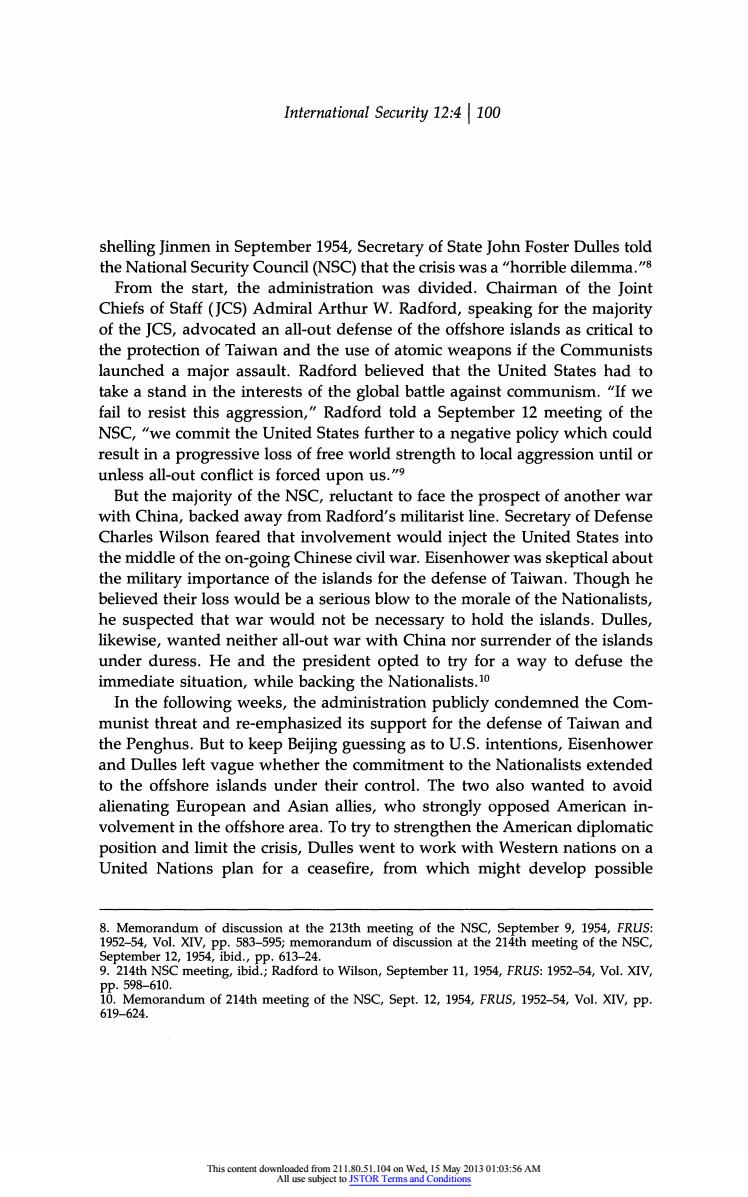正在加载图片...

International Security 12:4100 shelling Jinmen in September 1954,Secretary of State John Foster Dulles told the National Security Council(NSC)that the crisis was a "horrible dilemma."8 From the start,the administration was divided.Chairman of the Joint Chiefs of Staff(JCS)Admiral Arthur W.Radford,speaking for the majority of the JCS,advocated an all-out defense of the offshore islands as critical to the protection of Taiwan and the use of atomic weapons if the Communists launched a major assault.Radford believed that the United States had to take a stand in the interests of the global battle against communism."If we fail to resist this aggression,"Radford told a September 12 meeting of the NSC,"we commit the United States further to a negative policy which could result in a progressive loss of free world strength to local aggression until or unless all-out conflict is forced upon us."9 But the majority of the NSC,reluctant to face the prospect of another war with China,backed away from Radford's militarist line.Secretary of Defense Charles Wilson feared that involvement would inject the United States into the middle of the on-going Chinese civil war.Eisenhower was skeptical about the military importance of the islands for the defense of Taiwan.Though he believed their loss would be a serious blow to the morale of the Nationalists, he suspected that war would not be necessary to hold the islands.Dulles, likewise,wanted neither all-out war with China nor surrender of the islands under duress.He and the president opted to try for a way to defuse the immediate situation,while backing the Nationalists.10 In the following weeks,the administration publicly condemned the Com- munist threat and re-emphasized its support for the defense of Taiwan and the Penghus.But to keep Beijing guessing as to U.S.intentions,Eisenhower and Dulles left vague whether the commitment to the Nationalists extended to the offshore islands under their control.The two also wanted to avoid alienating European and Asian allies,who strongly opposed American in- volvement in the offshore area.To try to strengthen the American diplomatic position and limit the crisis,Dulles went to work with Western nations on a United Nations plan for a ceasefire,from which might develop possible 8.Memorandum of discussion at the 213th meeting of the NSC,September 9,1954,FRUS: 1952-54,Vol.XIV,pp.583-595;memorandum of discussion at the 214th meeting of the NSC, September 12,1954,ibid.,pp.613-24. 9.214th NSC meeting,ibid.;Radford to Wilson,September 11,1954,FRUS:1952-54,Vol.XIV, PP.598-610. 10.Memorandum of 214th meeting of the NSC,Sept.12,1954,FRUS,1952-54,Vol.XIV,pp. 619-624. This content downloaded from 211.80.51.104 on Wed,15 May 2013 01:03:56 AM All use subject to JSTOR Terms and ConditionsInternational Security 12:4 | 100 shelling Jinmen in September 1954, Secretary of State John Foster Dulles told the National Security Council (NSC) that the crisis was a "horrible dilemma."8 From the start, the administration was divided. Chairman of the Joint Chiefs of Staff (JCS) Admiral Arthur W. Radford, speaking for the majority of the JCS, advocated an all-out defense of the offshore islands as critical to the protection of Taiwan and the use of atomic weapons if the Communists launched a major assault. Radford believed that the United States had to take a stand in the interests of the global battle against communism. "If we fail to resist this aggression," Radford told a September 12 meeting of the NSC, "we commit the United States further to a negative policy which could result in a progressive loss of free world strength to local aggression until or unless all-out conflict is forced upon us."9 But the majority of the NSC, reluctant to face the prospect of another war with China, backed away from Radford's militarist line. Secretary of Defense Charles Wilson feared that involvement would inject the United States into the middle of the on-going Chinese civil war. Eisenhower was skeptical about the military importance of the islands for the defense of Taiwan. Though he believed their loss would be a serious blow to the morale of the Nationalists, he suspected that war would not be necessary to hold the islands. Dulles, likewise, wanted neither all-out war with China nor surrender of the islands under duress. He and the president opted to try for a way to defuse the immediate situation, while backing the Nationalists.10 In the following weeks, the administration publicly condemned the Communist threat and re-emphasized its support for the defense of Taiwan and the Penghus. But to keep Beijing guessing as to U.S. intentions, Eisenhower and Dulles left vague whether the commitment to the Nationalists extended to the offshore islands under their control. The two also wanted to avoid alienating European and Asian allies, who strongly opposed American involvement in the offshore area. To try to strengthen the American diplomatic position and limit the crisis, Dulles went to work with Western nations on a United Nations plan for a ceasefire, from which might develop possible 8. Memorandum of discussion at the 213th meeting of the NSC, September 9, 1954, FRUS: 1952-54, Vol. XIV, pp. 583-595; memorandum of discussion at the 214th meeting of the NSC, September 12, 1954, ibid., pp. 613-24. 9. 214th NSC meeting, ibid.; Radford to Wilson, September 11, 1954, FRUS: 1952-54, Vol. XIV, pp. 598-610. 10. Memorandum of 214th meeting of the NSC, Sept. 12, 1954, FRUS, 1952-54, Vol. XIV, pp. 619-624. This content downloaded from 211.80.51.104 on Wed, 15 May 2013 01:03:56 AM All use subject to JSTOR Terms and Conditions